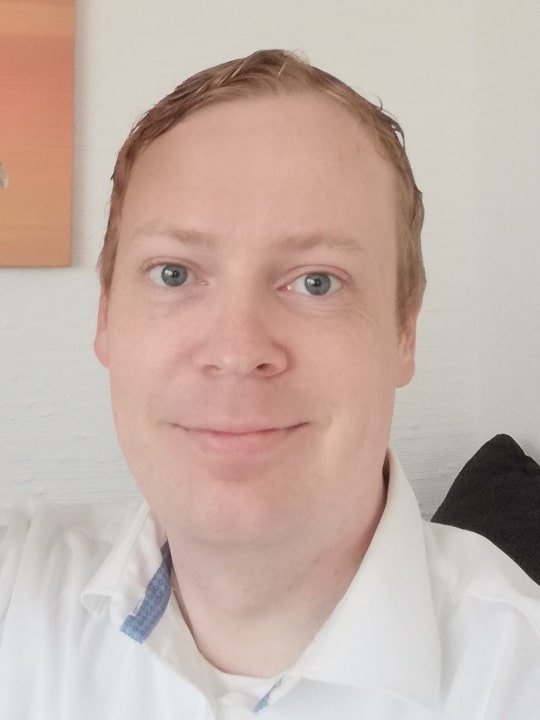In this episode Steven and William share their excitement for science-fiction as it pertains to self-awareness, free will and the difference between man and machine, if there is any. Will there ever be conscious
Watch a Short Excerpt:
Transcript (continued):
Steven: And, I guess, linking it back to the robotics side of things, where that's what we're exploring as a humanity: projecting our, I guess, our desire to discover who we are as beings by creation, because that's pretty much how we will always do it, and creating a machine robot that reflects ourselves is a way to explore ourselves, because you're creating something that is like you or like us as a species. I guess you'd have to do it, again, I don't do robotics, but you'd have to get and go through so much data, so much, you have to understand so much philosophy, so much emotions. You have to understand... It hurts my head, trying to think about it... then be able to create something like that, that does it by itself.
William: But, so when you do create something that behaves similarly to you, or to a human in general, then I think the next step is that you believe that what you did to make this machine the way it is is the same that made you who you are. I remember when... This blew my mind the first time I sat in a lecture about logic in computer science, and I realized that the formulas, the logical formulas that we're writing down, explaining something mathematical, just not as complex as something about human behavior; just something in math, something abstract... I thought "okay this describes the behavior. But at the same people believe that this IS the behavior. That this is what generates the behavior in the first place." But I believe that there's still a step in between, and that they might just seem the same but they don't have to be the same. Does that make sense? hen I say, when I say "oh, you seem to drink orange juice every second day", and I watch you. Say this is with someone I live with so that I get I can notice this really every day. And then so I set up this rule. I can write it down mathematically if I want to. Every second day this person drinks orange juice, and the other days they don't, but usually you don't have to say that. Anyway, now does the person do that because they had a rule written somewhere inside of their brain that that is what they do? Or is it that they they drink orange juice every time they feel sad and that's just how they deal with it? And for some totally different reason they feel sad; it's just a coincidence that they feel sad every secon day. So the rule is "let's do something totally different, but..."
Steven: Where did the rule come from? Is it wired into our being? Is it a consequence of variables throughout the past of their existence? So it wasn't necessarily why I did again environment type factors that can change at any point in life. Or is it, as you say, they've just consciously decided? "Well okay, I just wanna... I'm gonna have it every other day because that's it we're gonna stick to." To me, I mean it's more, but it's, to me there's three different things going on there.
William: Okay. I already forgot the first two. So tell me: environmental factors?
Steven: The first one is hardwired into their system.
William: Okay.
Steven: So DNA, genetics, whatever, coded... who knows that there's something in there that was gonna make them always get to the point where they were gonna have orange juice every second day. Or they go through life and just think things happen, environment, external factors. Maybe, like you say, their mom used to do it every second day. Who knows. They decided that they... that's more of a philosophy.
William: And the third one was conscious choice.
Steven: Conscious choice: that kind of crossed over there a little bit from environmental conscious choice.
William: Yeah, they're not totally clearly divisible.
Steven: I'm trying to divide something that isn't actually, you know, separated out so I can understand those three different points, but actually they all intertwine. whatever.
William: So it is really useful though. The first two points are very similar to the nature versus nurture debate.
Steven: Yeah, that's the obvious one.
William: And the third one is relevant for our discussion about consciousness and free will, because certain people, I mean a lot of people, believe that conscious decision-making is just an epiphenomenon, it's just something that we tell ourselves exists, but actually it's just an illusion; and everything we do is predictable or, what's the other word, determined, so that our behavior is deterministic. And machines are deterministic, at least the way they are right now. You say one day they might not be, and that's interesting. But yeah, it's really difficult to know how I make decisions. You could say... You can reduce a lot of what I do back to something else in the past, like the way I was raised.
Steven: Yeah.
William: The things already mentioned; or just how I work. And I do a lot of things without consciously knowing that I'm doing them, like I heard once that you are attracted to someone if when you kiss your saliva chemically harmonizes. Or just pheromones that you give off, you can like them about someone else and then you're attracted to them. So there are all these factors that you don't know are working on you, and they influence your decision-making. So things like that certainly show that there is truth to this unconscious decision-making. But does it mean that everything works that way? I think that would be too far-reaching and, again, extrapolating from the knowledge you do have to "oh this is how everything works".
Steven: Yeah. I always find important not to jump to absolutes; again, just one thing I've learnt from Dune, where you say THIS is how it is. Well no, this is how I believe it is, but there's a hundred different factors that I'm going to absorb, listen to, take on board that can also be right, or could be part of the equation. Right and wrong very absolute terms, trying to express the variation of the situation. It's difficult.
William: Yeah, I think it's a matter of arrogance or humility. At least once you have reached a point where you become aware that you're aware. That's critical too. So if you think about children, they do a lot of things out of necessity, just automatically, basically. But something will change, and it's a process, I don't know if it can happen all of a sudden. But when they become aware how their decision-making works and that they can actually change what they want to do...
Steven: Isn't it in the test, the sweet test. You put a child, honestly, a table, and you give them sweet in front of them, and you say "if you wait ten minutes you get two sweets", And the child just sits there; and most children just eat the one sweet because they feel the necessity just... they're like "this is good now. I love it."
William: Is it important for the test that you leave the room?
Steven: Yes. I think so, yeah. They're on their own with the sweet. I think it's again it does many different things. But I think, again, it shows what you just said, where you learn a point where you actually, you can override the conscious impulse to eat the good thing or sugar egg, to realize that you get something better if you wait or something, it's a better, a positive outcome if you just wait. Because I think that's what a lot of choices are. I think a lot of choices are action and reaction. It's something happens to you and you automatically respond. It's putting up a wall in my, again, this is my opinion, that free will is where you're able to put up a wall and go "okay, just pause for five seconds and do a bit of conscious choice-making, to then make the decision, to then do what you want to do. Because again, it's not necessarily about what is right or wrong, it's what you as an individual want to do in that situation.
William: Right.
Steven: You might want to go and punch the person, that's an example here, is if you're in an argument or something, and your impuls is, let's say, fight, fight or flight. And in the past it seems you've just done it out of impulse. You hit the person and then you got in trouble, or whatever, or you've not. If you can get the point where you can go "No, I don't want to hit the person", walk away or "Yes, I do want to do it" and then still do it; that shows a conscious choice-making situation, again, in my view, my little naive view.
William: You know, I think that's really a good perspective for this topic. It's easy for us to look at children and say "oh they've just made... they've just taken a step to another level of consciousness", and then it helps to, when I remind myself that I'm not that different from children. I've made certain changes but I can still make lots and lots of changes. So I'm just on one of the many steps on this staircase towards higher and higher consciousness, you could say. I also love that you used the word "respond". I can respond to the situation, I mean impulsively, or I can just, you know, react without knowing why or how. Or I can choose how to respond. And the word responsibility comes from "respond", because I have the "ability to respond". I am response-able. And so that is a power that you can gain. I'm not sure how exactly the process works. But you can certainly decide to be open for it. And then with experience and just trying over and over you can gain a higher level of responsibility, of awareness. And I think that's a very valuable thing to work on.
Steven: Definitely. On the flip side, just to throw a contradictory example, discussion out there, is you can spend too long thinking and worrying about things. You can over-analyze. A lot of my anxiety and depression problems come from that. They've come from just sitting there and thinking too much about a situation and not just letting my own impulses do the thing. Because sometimes I'm like "Okay, is this the right way? Is this the wrong way?", in the past. Now I just go to that core thing of what do I want, what makes me happy? And then I just do it. And if it goes wrong or seems to go wrong I'm like "meh, whatever it doesn't matter. It's what I wanted to do. I tried it." I have that integrity and that happiness that I did it. No matter what happens that went or what goes wrong. I'm like "Wow, yeah. Go me. I had the consciousness to just do what I thought would help me be happy."
William: The non-useful thoughts, do they go in circles? Is that what you're talking about?
Steven: They can do, yeah.
William: You try to analyze and be all cognizant, but it never leads anywhere.
Steven: Yes, yeah. Again, that's where children come in. I mean, you're example of humility links back to kids because you're showing you're humble by looking at them as an example, because we're not much different from them. We are not- We think as adults we think we've suddenly become this higher being than those, the universe and knows how much more in children. But children just they are such prime examples of so many different things, and fun, fun and play. We talk about last time or talked about it befor where, yeah, just it was last time: being able to play is a great way to learn, just having fun and not overthinking things.
William: CBT stands for cognitive behavioral therapy, and the cognitive therapy part is the self-analyzing. trying to figure out what's going on, thinking about your own thoughts and seeing how you can change those patterns, to help. But behavioral part is what you're just talking about, at least I believe that's what behavioral therapy is about: how you just need to do something sometimes; just act out what you believe to be right or what you believe to be healthy in the moment, without knowing it in theory, you know, in your brain. And both are necessary for mental health or for health in general.
Steven: A lot of it is to do with fear fear, of getting it wrong or making a fool of ourselves, or whatever the reasons that we prefer just to think about it and go through it in our brains. And again, in our brains we... often it lies to us. It tells us things like this social situation is gonna be scary or whatever. And in many ways it's a self-fulfilling and prophecy where, because you think it's scary, your brain releases the biological side of things, yeah, anxiety; when actually if you just went and did it, and didn't think about it, you'd be like "okay, cool this is fun or whatever else". That's what I got stuck in way back. But again, I keep trying to refer this back to the original sort of questions about robotics. Do you think that they could make a machine, I guess, express what we're expressing, because you know more about these things than I do. Expressing awareness of fear? Awareness of fun through learning?
William: Let me give you a high-level answer that doesn't go into so much detail. The first thing that jumps to my mind is Kurt Gödel. Have you heard of him? He was a mathematician in the 30s, at least that's when he made his huge contributions. He was a party-pooper. I like to call him that because people at the beginning of the 20th century were so excited about all these new discoveries about logic. So you know we're excited about technological advances in the last few decades. But they were excited about the theoretical advances about understanding math and logic better and what you can write down on paper about nature. So do you see the link, yeah? You first need to understand these things in theory before you can recreate them.
Steven: Definitely.
William: David Hilbert, at the turn of the century came up with, I don't know, 15 problems or so that he formulated for scientists in the 20th century and he said if you have nothing to work on, try one of these. And there were really difficult problems. You can look on Wikipedia which of them have been solved, which have't been solved. Sorry?
Steven: I think I've heard of those.
William: Good. And I think maybe a third of them are solved, and that's about it. But one of them was: can you describe everything that happens in the universe mathematically? And people believed yes. They were very optimistic about this problem. And then Kurt Gödel came along and he showed that "Nope". He didn't have to go through every possible situation and show, and find one that doesn't work. He showed that mathematically in itself, mathematics in itself is incomplete. It doesn't mean it's wrong or useless. It just means it has its limitations. For example, when you create a formula, when you write down a formula that is trying to express something about itself, and this is similar to a machine trying to think about itself, it's analogous, in theory it's the same. When you, when you try to do that it is possible, but only to a certain extent. Because there are certain formulas, mathematical formulas, that will express something and you can derive it to be true from basic truths. I'll give you an example of some of the logical steps that you can make in mathematics: modus ponens is a rule that is when you have two rules one of them says if A then B, and the second one says A which means A is true; and the first one says if A is true then B must be true. If you combine the two if you say that both are true then you can know as a consequence that B is true. You know that A is true and we know that if A is true then B is true. If you combine the two you get B, or B is true. So that's one basic rule that most people most scientists can agree on in most situations it holds true. You can come up with some quirky situations but it doesn't, but let's stay in the common sense area. And so you have a set of these, maybe a dozen. And you you can express infinitely many very complex things about nature or any mathematical system. And the the logic will be consistent for that. If X is true then it's negation must be false, right? If I say sun is shining and it is, then the sentence "the Sun is not shining" must be false. But with the mathematical logic that we have, that we're using right now. the standard arithmetics, you can derive a sentence, the system will predict that the sentence is true and that its negation is true.
Steven: Yeah
William: So, I don't remember how, I looked at a proof once. It's complicated. But Kurt Gödel came up with this in the 30s and showed that the mathematical system has been very useful, but it has its limitations, because obviously something and it's negation cannot always be true at the same time. And so that shows that No, that the mathematical system we were using right now is not able to cover everything. We cannot express everything with it. And that to me is fundamentally important because it shows that there are still things outside of the very system, the language, the mode of thinking that we use to make sense of nature, our environment and ourselves. Sp I hope that you can see the connection between that discovery and your question about self conscious machines. As long as we build machines based on the mathematics we use right now, I believe that they will at least be limited.
Steven: Okay.
William: You might be able to create zombies.
Steven: Well we're limited as well, so. So I guess our limitation creates the limited machine. Therefore we need to improve our own limitations to be able to create.
William: The last thing we said was humans are limited in our thinking in our scientific methods. And then you said that then it's no surprise that the machines that we create are also limited.
Steven: Yeah.
William: And that makes a lot of sense since, I believe, you need to be at a higher level than the thing you create because basically you need to be able to create everything it does, you need to be able to understand everything it does.
Steven: Interesting point, because again, creation often happens through accident, I guess. like just random chaos, I guess. I don't think people realized exactly what they're doing when they split the atom. I mean, maybe they did. I don't know. But is it something they planned for?
William: There are examples that what you're talking about. Like penicillin was discovered accidentally.
Steven: Yeah, so leaps in technology can... that's where, again, all the I guess disaster films come from where it's like "do we jump forward in robotics?" It's the point where we actually create something that is beyond us. And then...
William: We should definitely discuss that another time.
Steven: I think it would be a good part two. I think this is a good ongoing discussion that could quite easily take up another session.
William: Of course, yeah.
Steven: So if you want to...
William: Some people call this topic "AI safety". Elon Musk is a big proponent of being more careful and not just going for every idea you have. Especially people do that when there are economic incentives behind it. He had a fight, you could say, a debate with Mark Zuckerberg on Twitter once. But they went back and forth what is safe to do? When should you be more careful and not care so much about all the money that you could make just because you're the first to try this new approach? Yeah, it's a big topic.
Steven: It is, it really is. Have you felt like you've discussed a lot of what you wanted to in this session?
William: Yeah, obviously it evolved organically, just like you predicted. And I didn't expect to go into mental health or some of the history of mathematics. But it's all related, obviously. So yeah, I'm very happy with the way it's gone. And we could spend another hour on it, which would definitely make another episode.
Steven: Yeah, I'm happy to do that.
William: Good. What do you think about the idea of sometime in the future also getting on someone else to speak with us or with one of us about a topic?
Steven: Yeah. I'm always yeah like I mean, I just kind of just talked about limitations like it's always good to get another viewpoint. It'd be nice. Wouldn't it be amazing if we can link up you know seven billion people and get a lot of different perspectives together? But again, limitations; so having someone else that has a perspective and knowledge and is always good fun, yeah.
William: It doesn't have to be an expert, just another voice that brings some diversity.
Steven: Yeah. Again, we're not exactly experts.
William: Yeah.
Steven: Well, you are in many things.
William: Well, I studied certain things, and you could tell I'm really excited to talk about them.
Steven: Yeah.
William: And I'm happy to have this outlet, this way to express them.
Steven: I like listening to them. I've always went... In our previous discussions. I've lost number of years. I've really enjoyed because we were very different in our own knowledge base, I guess. I guess that's what happens as humans. But just you have such a incredible understanding of, again, the coding, computing language and how it relates to humans, to us. And you do a very good job of humanizing it all. Because a lot of times I separate myself from that kind of stuff because to me it feels so foreign to how my own perspective perceives things, that it seems unhuman. But actually the way you break it down and talk about it really helps me to open my mind more to that. I think I still very rarely understand it, but it just gives me a little bit of knowledge.
William: I know what I mean, yeah. I think it's sad when people strictly try to separate the science from what it means for us in everyday life. And humanization is important, like the ethics question for example. That should always come along with the scientific development. You shouldn't just do something because it's fun or because there's lots of money in it. Progress isn't always all good, or at least you should say there are different types of progress.
Steven: Yeah, again, it's intention, isn't it. Ontention behind the progress.
William: Yeah, and the unintended consequences that you need to repair afterwards...
Steven: Which, I guess, is a good link. Right there actually. That question could be our starting point for next session: the intentions behind creating, again, machines that have consciousness and affect our day-to-day lives potentially. And (1) why you want to do that? And (2) should we do that? (3) Is it she worthwhile? These things we can discuss, I guess.
William: Definitely, yeah.
Steven: To start with. Maybe you have our ideas. But just...
William: No, I have tons of ideas, just in response to the things you were saying. But I'd better write them down, and not try to cover them all now.
Steven: There we go.
Other Episodes:
Ep. 51: How Conditioned Are We ?
How much of what you do, think and feel comes from intentional, free chosing? How much of your actions and decisions are pre-programmed? You are the product of your upbringing, culture and genetics. What is out of our control? What can we influence? How can we counteract our predestination?
Ep. 50: What Am I Responsible For ?
Are you taking too little responsibility for your actions, or perhaps too much? How much are you able to understand or determine the consequences of your decisions? Are you in control of anything? Is free will an illusion? Can you do something to improve your thoughts, feelings and relationships with...
Ep. 49: Empathy Can Be A Super Power
Everyone has the choice of either living isolated from other people and their own feelings on the one hand, or to connect with others and their own emotional core. The road towards connectedness involves vulberability and weakness. But it leads to a very rewarding ability that includes deeper understanding of...
Ep. 48: Why Am I Ashamed?
What secrets do you have? What facts about you must never become known to others? What happens in our childhood that implants beliefs in us that hide away for the rest of our life? Can we uncover them deliberately? Can we regain the emotional freedom and levity that playing children...







